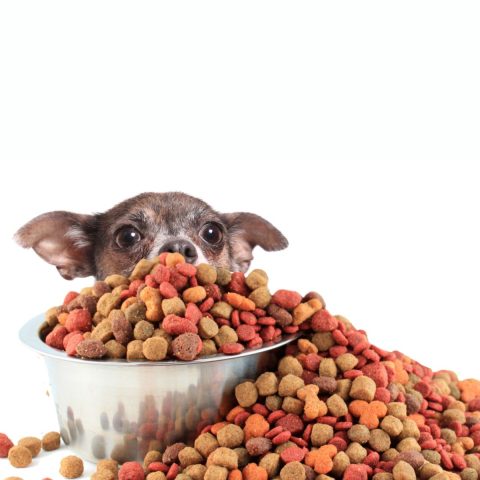You might be surprised to learn that nearly 60% of dog owners consider their pet’s diet a top priority, yet many still settle for traditional kibble loaded with fillers and by-products. But what if you could tap into the full nutritional potential of your dog’s food? By choosing organic, you can tap into a wealth of benefits that extend far beyond a shiny coat and healthy digestion. As you explore the world of organic dog food, you’ll discover a cascade of advantages that can revolutionize your furry friend’s overall health and well-being – but that’s just the beginning.
What Makes Organic Dog Food Special

When you choose organic dog food, you’re selecting a product that adheres to rigorous standards, guaranteeing your pet consumes only the highest-quality ingredients, free from pesticides, synthetic fertilizers, and genetically modified organisms. These strict guidelines guarantee that the food you feed your furry friend is not only wholesome but also sustainable.
To earn the organic label, manufacturers must undergo stringent certification processes, which involve thorough inspections of farming practices, processing, and handling procedures. This certifies that the entire supply chain meets the highest standards of quality and integrity. Organic farming practices prioritize soil conservation, biodiversity, and ecological balance, resulting in a more environmentally friendly and sustainable food system. By choosing organic dog food, you’re supporting eco-conscious farming methods that benefit both your pet and the planet.
The Dark Side of Traditional Kibble
As you explore the world of traditional kibble, you’ll uncover some unsettling truths. You’ll find that many popular brands contain hidden ingredients and unhealthy preservatives that can compromise your dog’s health. It’s time to shine a light on these dark secrets and explore the concerning realities of conventional dog food.
Hidden Ingredients Exposed
You may think you’re providing your furry friend with a nutritious meal, but traditional kibble often contains hidden ingredients that can wreak havoc on their health. Label deception and ingredient manipulation are common practices in the traditional pet food industry. Manufacturers often use vague terms like ‘meat’ or ‘by-products’ to disguise low-quality ingredients, making it difficult for you to make informed decisions about your dog’s diet.
When you dig deeper, you may find that seemingly harmless ingredients are actually harmful fillers or by-products. For instance, ‘animal digest’ can be a euphemism for recycled slaughterhouse waste, while ‘meat meal’ can contain rendered roadkill. These hidden ingredients can lead to digestive issues, allergies, and even chronic diseases in your dog. By not disclosing the true nature of these ingredients, manufacturers are putting your dog’s health at risk. You must be aware of these deceptive practices and make informed choices about your dog’s nutrition. As a responsible pet owner, you deserve to know what you’re feeding your furry friend.
Unhealthy Preservatives Revealed
Traditional kibble manufacturers often rely on a cocktail of unhealthy preservatives to extend shelf life, but these chemicals can have devastating consequences for your dog’s health. You might be unaware of the toxic chemicals lurking in your dog’s food, but being informed is vital to make a change. Food additives like BHA, BHT, and ethoxyquin are commonly used to prevent spoilage, but they’ve been linked to serious health issues, including cancer and organ damage.
| Preservative | Health Risks | Found in |
|---|---|---|
| BHA | Cancer, liver damage | Dry dog food, treats |
| BHT | Liver damage, behavioral issues | Canned dog food, biscuits |
| Ethoxyquin | Liver damage, reproductive issues | Canned dog food, pet snacks |
These toxic chemicals can accumulate in your dog’s body over time, leading to chronic health problems. As a responsible pet owner, making an informed decision is vital to choose a dog food that avoids these unhealthy preservatives. Opt for organic, natural ingredients that prioritize your dog’s well-being. By taking proactive steps, you can help your furry friend thrive.
Wholesome Ingredients for a Healthy Coat
Rich, omega-3 fatty acid-packed ingredients like salmon and flaxseed nourish your dog’s skin and coat from the inside out, promoting a healthy, shiny appearance. These wholesome ingredients provide the essential building blocks for a vibrant coat, and they’re just the beginning.
Some other key ingredients that support a healthy coat include:
- Sweet potatoes, rich in vitamins A and E, which promote skin health and reduce inflammation
- Coconut oil, a rich source of medium-chain triglycerides that nourish the skin and coat
- Omega-3 fatty acid supplements, which reduce inflammation and promote a shiny, healthy coat
- Vitamin E supplements, which protect the skin from damage and promote healthy skin cell growth
- Turmeric, a natural anti-inflammatory that reduces skin irritation and promotes a healthy, glowing coat
How Organic Farming Benefits the Planet
By choosing organic dog food made from ingredients sourced from organic farms, you’re supporting a more sustainable food system that promotes ecological balance and reduces environmental degradation. Organic farming practices prioritize Soil Conservation, which helps maintain fertile soil, reduce erosion, and preserve biodiversity. This approach also encourages Eco Friendly Practices, such as crop rotation, composting, and minimal use of synthetic fertilizers, resulting in a significant reduction of greenhouse gas emissions.
As you feed your dog organic food, you’re contributing to a larger movement that values environmental stewardship. Organic farming promotes healthier ecosystems, conserves water, and reduces pollution. By supporting organic agriculture, you’re helping to create a more sustainable future for your dog and for generations to come. By making this conscious choice, you’re part of a community that cares about the well-being of the planet and its inhabitants. Together, we can make a positive impact on the environment, one bowl of organic dog food at a time.
Nutrient-Dense Recipes for Optimal Health
Feeding your dog nutrient-dense recipes made with organic ingredients helps support overall wellness, as these recipes provide the essential vitamins, minerals, and antioxidants necessary for maintaining a strong immune system, healthy digestion, and vibrant energy. By choosing organic dog food, you’re giving your furry friend the best possible start in life.
Here are some key considerations to keep in mind when selecting nutrient-dense recipes for your dog:
- Protein sources: Look for recipes that feature novel protein sources like salmon, duck, or lamb, which can help reduce the risk of food sensitivities and allergies.
- Meal frequency: Divide your dog’s daily ration into 2-3 meals to mimic their natural hunting instinct and support healthy digestion.
- Whole food ingredients: Choose recipes that feature whole food ingredients like sweet potatoes, carrots, and green beans, which provide essential fiber, vitamins, and minerals.
- Omega-3 rich ingredients: Incorporate recipes that include omega-3 rich ingredients like flaxseed, chia seeds, or salmon oil to support healthy skin, coat, and joints.
- Limited ingredient diets: Consider recipes with limited ingredient diets to reduce the risk of food sensitivities and allergies.
Making the Switch to Organic Dog Food
When shifting your dog to an organic diet, it’s essential that you introduce the new food gradually to prevent digestive upset. A sudden change can lead to stomach issues, diarrhea, and vomiting. To avoid this, mix a small amount of organic food with their regular meal and gradually increase the proportion over 7-10 days.
| Day | Organic Food Ratio | Regular Food Ratio |
|---|---|---|
| 1-2 | 25% | 75% |
| 3-4 | 50% | 50% |
| 5-6 | 75% | 25% |
| 7-10 | 100% | 0% |
| After 10 days | 100% | 0% |
This gradual introduction timeline allows your dog’s digestive system to adapt to the new food. Keep in mind that every dog is different, and you may need to adjust the gradual introduction timeline based on your dog’s individual needs.
When considering the cost comparison between organic and conventional dog food, remember that organic options may be more expensive upfront. However, the long-term health benefits and potential reduction in veterinary bills may make the investment worthwhile.
Frequently Asked Questions
Can I Mix Organic Dog Food With My Pet’s Current Kibble?
When switching your pet to organic dog food, you can mix it with their current kibble, but do it gradually, creating a conversion plan to prevent digestive upset, introducing the new food in small increments over 7-10 days.
Are Organic Dog Food Options Available for Pets With Allergies?
Luckily, you’re not alone in dealing with pet allergies! Yes, organic dog food options are available for pets with allergies. Consider allergy testing to identify food sensitivities, then choose an organic food tailored to your pet’s specific needs.
Do Organic Dog Food Recipes Cater to Specific Life Stages?
As you navigate your dog’s life journey, you’ll find organic dog food recipes catering to specific life stages, such as puppy development and senior nutrition, ensuring your pet receives tailored support for peak health and well-being.
Can I Make My Own Organic Dog Food at Home?
You can make your own organic dog food at home, just like Sarah, who prepares a weekly batch using fresh ingredients, ensuring kitchen safety, and precise meal portioning for her pup’s ideal health.
Are Organic Dog Food Brands More Expensive Than Traditional Brands?
You’ll find that organic dog food brands are generally pricier than traditional ones, but you’re paying for higher-quality ingredients and manufacturing processes, which can justify the added cost for your pet’s long-term health.
Conclusion
As you tap into the nutritional power of organic dog food, you’ll witness a transformative impact on your furry friend’s overall health and well-being. With every bite, you’ll be supporting healthy digestion, a lustrous coat, and a robust immune system. By choosing organic, you’ll be reducing the risk of chronic diseases and promoting a healthier, happier pet. Make the switch today and discover a brighter, more vibrant companion by your side.
